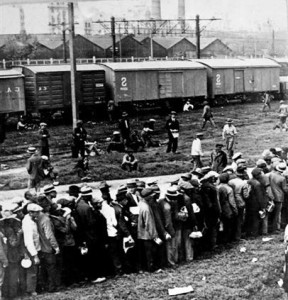 The Great Depression brought mass suffering to all regions of the country. National income dropped by 50 percent and unemployment rose to an estimated 25 percent of the total labor force. At the same time, twenty million Americans turned to public and private relief agencies for assistance. As the “Last Hired and the First Fired,” African Americans entered the Depression long before the stock market crash in 1929, and they stayed there longer than other Americans. By 1933, African Americans found it all but impossible to find jobs of any kind in agriculture or industry. As cotton prices dropped from eighteen cents per pound on the eve of the Depression to less that six cents per pound in 1933, some 12,000 black sharecroppers lost their precarious footing in southern agriculture and moved increasingly toward southern, northern, and western cities. Mechanical devices had already slowly reduced the number of workers required for plowing, hoeing, and weeding, but now planters also experimented with mechanical cotton pickers, which displaced even more black farm workers. Despite declining opportunities in cities, the proportion of blacks living in urban areas rose from 44 percent in 1930 to nearly 50 percent by the onset of World War II.
The Great Depression brought mass suffering to all regions of the country. National income dropped by 50 percent and unemployment rose to an estimated 25 percent of the total labor force. At the same time, twenty million Americans turned to public and private relief agencies for assistance. As the “Last Hired and the First Fired,” African Americans entered the Depression long before the stock market crash in 1929, and they stayed there longer than other Americans. By 1933, African Americans found it all but impossible to find jobs of any kind in agriculture or industry. As cotton prices dropped from eighteen cents per pound on the eve of the Depression to less that six cents per pound in 1933, some 12,000 black sharecroppers lost their precarious footing in southern agriculture and moved increasingly toward southern, northern, and western cities. Mechanical devices had already slowly reduced the number of workers required for plowing, hoeing, and weeding, but now planters also experimented with mechanical cotton pickers, which displaced even more black farm workers. Despite declining opportunities in cities, the proportion of blacks living in urban areas rose from 44 percent in 1930 to nearly 50 percent by the onset of World War II.
HARD TIMES AND RISE OF NEW DEAL FOR BLACKS
As the number of rural blacks seeking jobs in cities escalated, urban black workers experienced increasing difficulties. Black urban unemployment reached well over 50 percent, more than twice the rate of whites. In southern cities, white workers rallied around such slogans as, “No Jobs for Niggers Until Every White Man Has a Job” and “Niggers, back to the cotton fields—city jobs are for white folks.” The most violent episodes took place on southern railroads, as unionized white workers and the railroad brotherhoods intimidated, attacked, and murdered black firemen in order to take their jobs. Nearly a dozen black firemen lost their jobs in various parts of the South. As one contemporary observer succinctly stated, “The shotgun, the whip, the noose, and Ku Klux Klan practices were being resumed in the certainty that dead men not only tell no tales, but create vacancies.” For their part, in the North and South, black women were forced into the notorious Depression era “slave market,” where even working-class white women employed black women at starvation wages, as little as $5 per week for full-time laborers in northern cities. In their studies of the market in Bronx, New York, two black women compared the practice to the treatment of slaves in Harriet Beecher Stowe’s novel Uncle Tom’s Cabin.
Despite mass suffering, the Republican administration of Herbert Hoover did little to aid the poor and destitute. Instead, the federal government established the Reconstruction Finance Corporation, which relieved the credit problems of large banking, insurance, and industrial firms. Although Hoover believed that such policies would create new jobs, stimulate production, and increase consumer spending, benefits did not “trickle down” to the rest of the economy and end the Depression. Still, African Americans rallied to the slogan “Who but Hoover” in the presidential contest of 1932.
To get the full impact of that time in history go to http://ic.galegroup.com/ic/uhic/ReferenceDetailsPage/DocumentToolsPortletWindow?displayGroupName=Reference&jsid=7812016b5ea4d6684ea4837e2c6ef921&action=2&catId=&documentId=GALE%7CCX3404500017&u=sand55832&zid=b57acc008e359910d5c24de390bb447b




